Women’s March- Sacramento- Part 2
After the Women’s March to Sacramento, I was elated. The cloud of despair had lifted and stayed gone as I clicked “Like” on Facebook posts picturing my friends and family at Marches all over the country. On Sunday morning, I met my writing buddy at Schnoogs, a popular local coffee shop, where talk of the March peppered the air. We ran into friends who had also marched and some customers said they’d watched coverage on TV and thanked us for our participation.
However, as my date with my friend came to a close, I could feel the hint of a virus closing in on me, so when I got to my car, I sent text messages canceling my plans for the rest of the day and went home to sit quietly in my chair reading and sipping a cold preventative hot beverage made from garlic, ginger, honey, and lemon juice. Ironically, the book I was finishing was called “Today Will be Different,” a quirky novel by Maria Semple, that closed with the narrator considering how to live with her husband who’d adopted a radically new approach to life that she couldn’t fathom.
From there, I proceeded to four hours spent in cyberspace, reading email, following links to articles like this one in which George Lakoff explains how the Democrats helped elect Trump. Friends were still posting on Facebook and Instagram about their March experiences, but now another kind of post was showing up—one from friends who had felt excluded and/or resentful of the March. There were also posts from Trump supporters who were insisting that we needed to give Trump a chance. And one chilling post that cited attacks on Barron Trump. Oh dear, I thought “NO!”—a ten-year-old child is off limits. I commented on a few of the posts and found myself immersed in revealing and sometimes uncomfortable conversations with people who saw things quite differently than me. I’m happy to say the threads remained civil, and I actually learned something.
Still, I was overloaded. I felt like I needed to find ways to engage more fruitfully in conversations with the opposition and I was swimming in suggestions about what to do to maintain the momentum following the March. I was starting to feel afraid. I went to bed as a bracing winter storm hit the region. I was sick, my cats were agitated, wind and rain were lashing the house, and I was alone, thinking that it was up to me to solve problems for which I couldn’t see solutions.
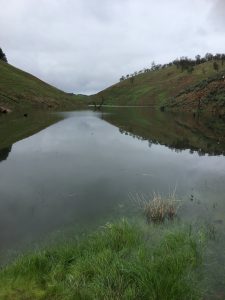
A couple hours after I got up in the morning, the storm broke, and a neighbor and I trekked cross country to check out the flow of Bear Creek and the height of the New Melones Reservoir. My lungs welcomed the fresh air as much as my spirit. My neighbor and I made a date for late afternoon to write postcards to our elected officials about our legislative priorities. When I got home, I checked Facebook and read a post from a wise teacher I had met in graduate school. He admitted he felt “pulled out too far” and would be retreating for a while.
Yep, that described my feeling pretty well—pulled out too far. I decided to retreat too, but first I would blog about my March experience and write my postcards. We made postcards by cutting up greeting cards with beautiful or provocative images. Choosing the right image for each official felt almost as important as clarifying my priorities and shaping them into something that would fit on the cards. It was a feel-good exercise.
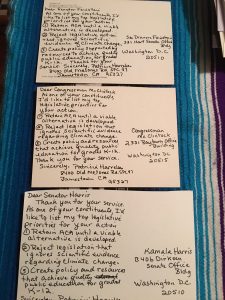
So now excuse me, please. I’m heading for a media fast to regroup and find my center again. See you in a while . . .
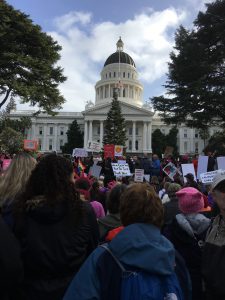 In early December, when I saw an announcement on Facebook about buses chartered to take women from Tuolumne County to Sacramento on January 21, 2017, I signed up. I didn’t have well-defined expectations. I simply wanted to be with other people who were unnerved by Trump’s election and expressing distrust. This is a report of what turned out to be meaningful to me during the March.
In early December, when I saw an announcement on Facebook about buses chartered to take women from Tuolumne County to Sacramento on January 21, 2017, I signed up. I didn’t have well-defined expectations. I simply wanted to be with other people who were unnerved by Trump’s election and expressing distrust. This is a report of what turned out to be meaningful to me during the March.
Notwithstanding marching with 20,000 like-minded people, I was deeply moved by connecting with specific people already known to me. Cindy was not able to make the March, so I invited my newest friend and neighbor Carolmarie. When we arrived at the loading place for the buses, I discovered that three of my long time friends were also making the trek. I knew many of the women boarding the buses, including the two sisters of the subject of a biography I’d just completed. Shortly after we started to march, I stumbled upon a woman who lives in Todos Santos near my brother. Later, after the March, I would see Facebook posts announcing that childhood friends, former work colleagues and neighbors, members of my writing group, book group, and master swim team had participated in the same March—not to mention friends and family far and wide who had participated in Marches at other locations. All day, I was reminded of the abiding connections I’ve made over the years, people who were my emotional, recreational, and, yes, political safety net.
Words are my livelihood and passion, so I was attune to the manner in which they served me and touched others. All day, I sent messages and photos to Cindy, so she could take part from a distance. I was gratified when two passengers on the bus complimented me regarding some of my published writing. And there were the signs carried by marchers. I scribbled their messages in a notebook as I walked. Here is one carried by my friend that said so much:
I’m with her–>
<–and her
and her–>
<–and her
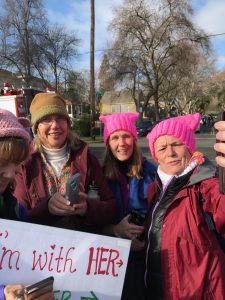
As we marched toward the Capitol, a roar could be heard forming several blocks ahead, which gradually moved through the crowd until we joined in, and then it passed on behind us. This happened again and again and made me think of the Helen Reddy song with the opening line, “I am woman; Hear me roar.” I was already feeling buoyed up by the company of women, and the repeating roar lifted me further. Likewise, early in the program when the Japanese Taiko Dan drummers performed, the rhythm felt like the heart beat of the crowd.
The program was heartfelt and filled with elected officials welcoming us, which felt promising. But the most significant moment of the trip happened long before we reached Sacramento when we were only 15 miles into the journey. I had to pee. The pressure rapidly became unbearable, so I asked the bus driver if there would be a restroom stop. “Yes, in an hour,” he said. I waited a few more minutes, but it was clear I couldn’t make it an hour. So I asked him to pull over so I could pee by the side of the road. He complied, and I flew off the bus as someone shouted, “Everyone look left!” I squatted by the tire to relieve myself as cars whizzed by. When I got back on the bus, everyone applauded.
The lesson for me was the importance of speaking up, even if it is embarrassing, doing what needs to be done, even if in less than ideal conditions. The relief I felt when I got back on the bus, the relief I felt during and after the March by connecting with others, confirmed that taking action, even when I’m unsure, can have satisfying results.
Tomorrow I’ll write about the March aftermath—which has been much more intense and unsettling than I expected—as I seek to define what proactive means to me.
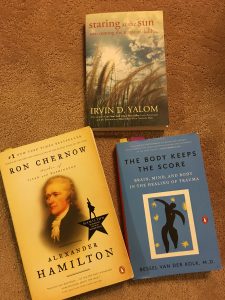
3 Books I Loved
I signed up for the 2016 Goodreads book challenge and read 33 books. Though I had hoped to read 45, I’m nevertheless quite happy with my reading this year because I read several fat biographies as opposed to a bunch of the slimmer volumes of poetry I normally read. Here are a few of the books I loved in 2016:
Non-fiction I loved: I started the year with Doris Kearns Goodwin’s No Ordinary Time: Franklin & Eleanor Roosevelt: The Front in World War II, an eye-opening account of a marriage, a presidency, and World War II from a wholly new perspective. I’m closing the year with Alexander Hamilton, Ron Chernow’s extremely well researched and insightful look at the man and the early days of our nation. I have to say this book has actually eased some of my fear about Trump as I discover that politics in this country has always been dicey and partisan, and yet we’ve survived. The Body Keeps Score by Bessel van der Kolk was an eye-opening, thought-provoking study of how trauma shapes the body and the brain.
Memoirs I loved: Life on the Road by Gloria Steinem (which secured my vote for Hillary over Bernie); On Immunity: An Inoculation by Eula Bliss, a mix of science research and personal experience that broadened my understanding of immunization; When Breath Becomes Air by Paul Kalanthi, a tender, insightful tale of young doctor’s approach to his own death.
Fiction: A Gentleman in Moscow (far and away the best book I read this year), The Danish Girl, brilliant example of an empathetic point of view, and Loving Eleanor, which was especially fun to read after In Ordinary Time.
Delightful escape literature: Bruno Chief of Police series by Martin Walker.
Inspirational reading: Staring at the Sun by Irvin Yalom saved my sanity immediately following the election
My Goodread reading challenge for 2017 is set at 40 books.
What books did you love in 2016?
 Twilightme.
Twilightme.